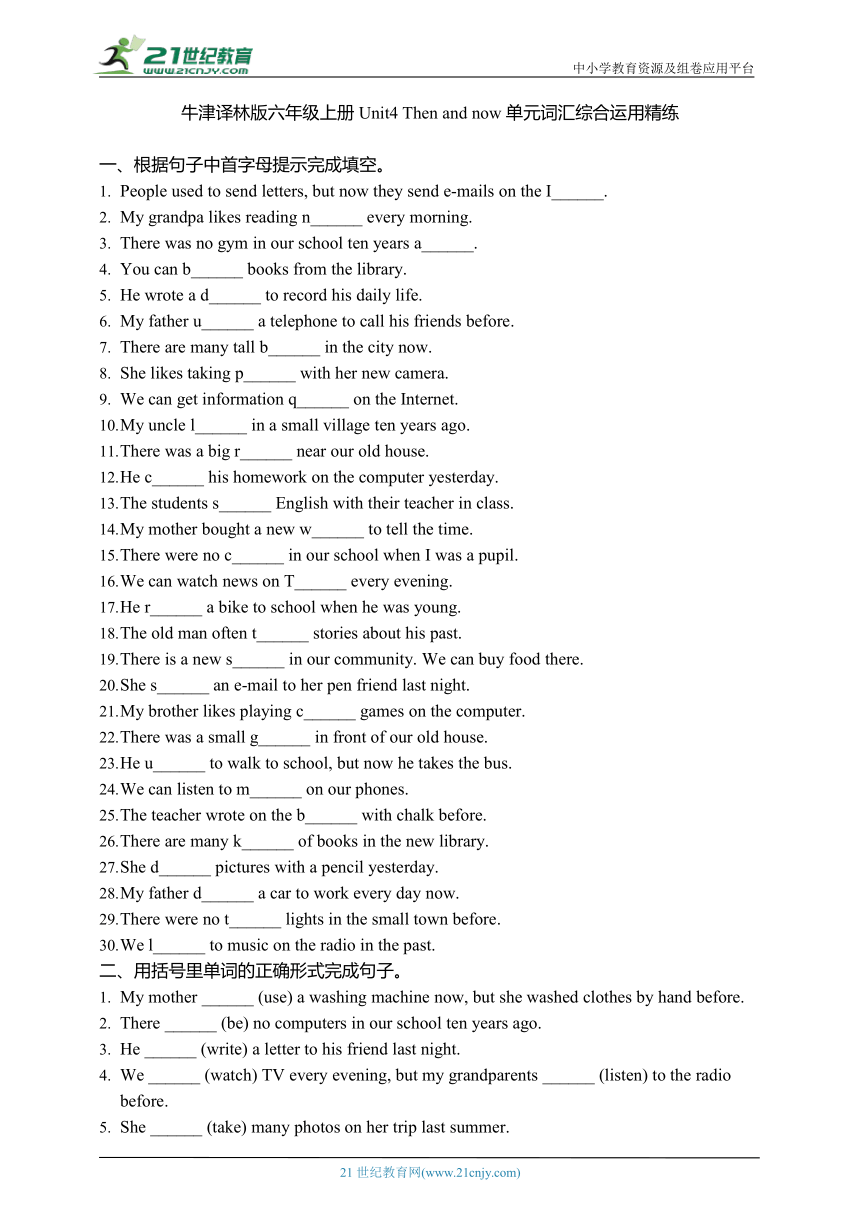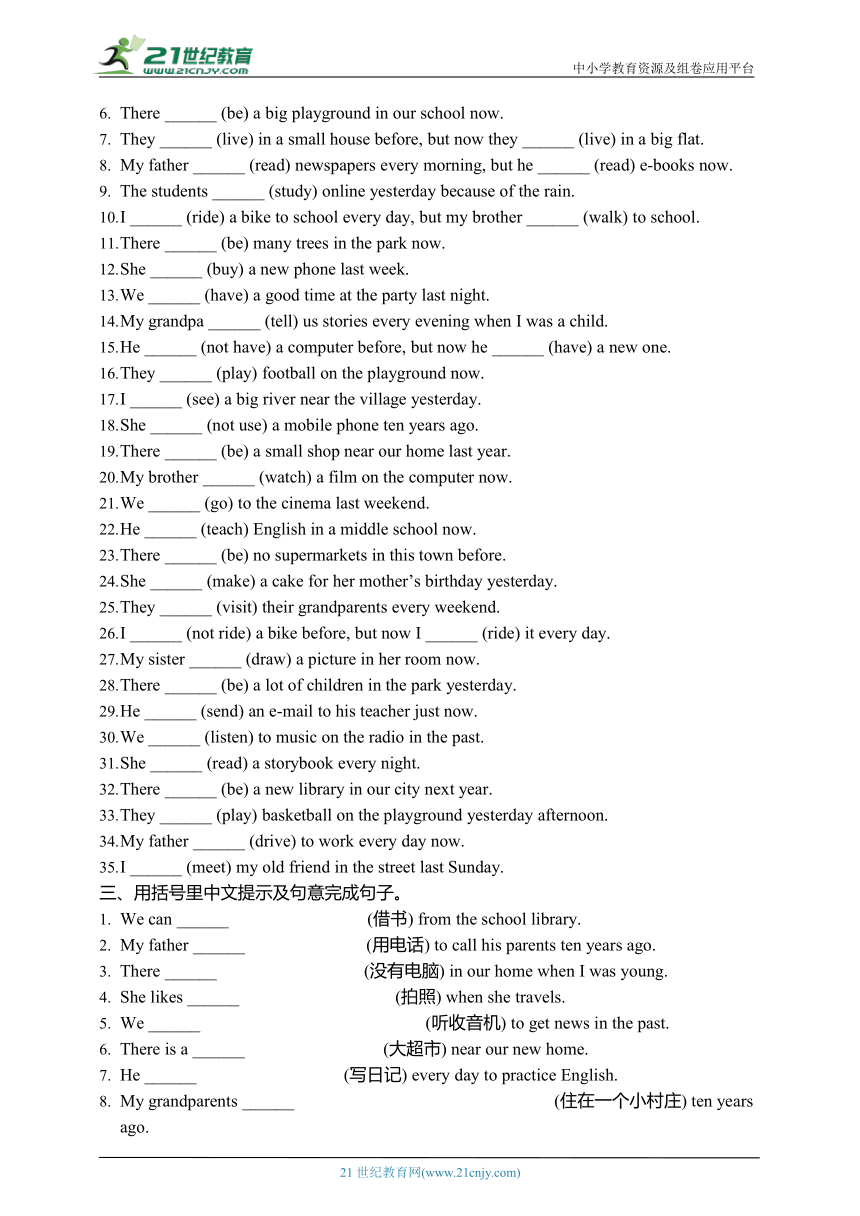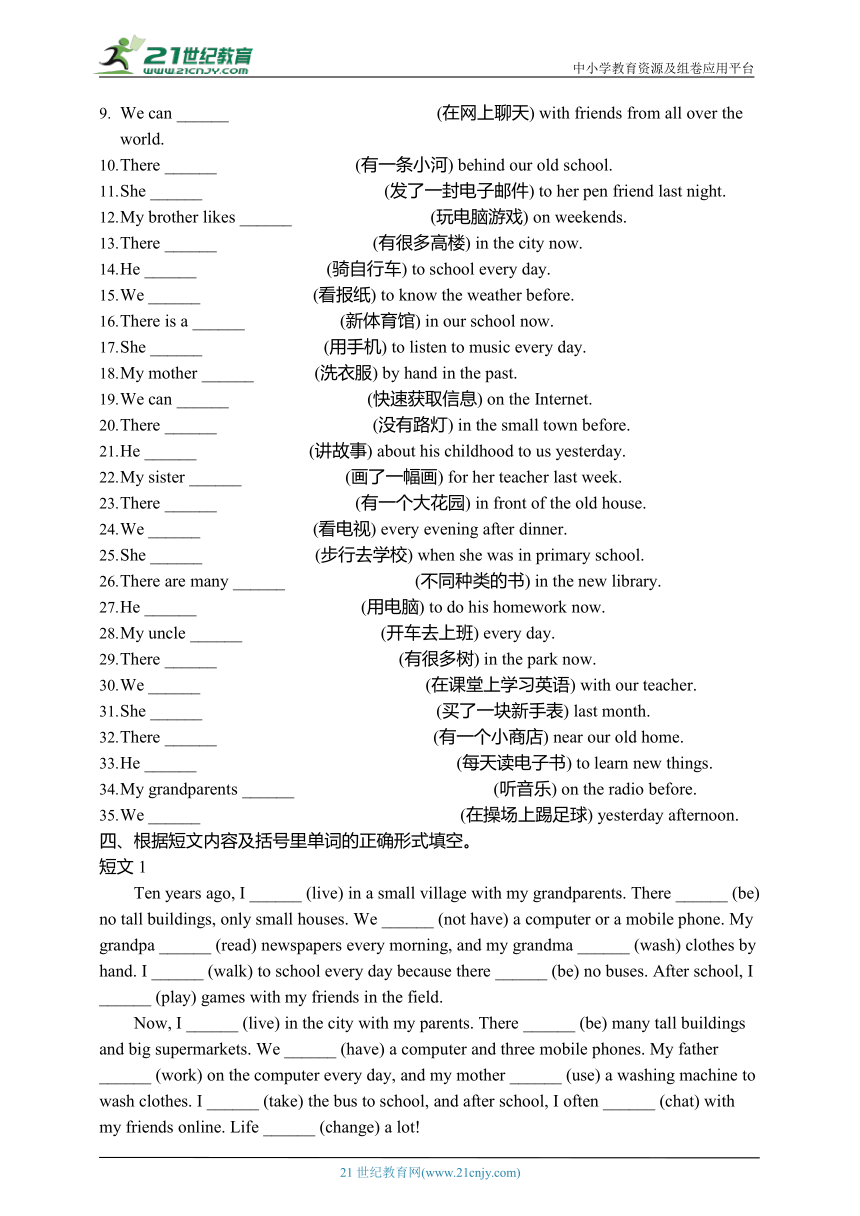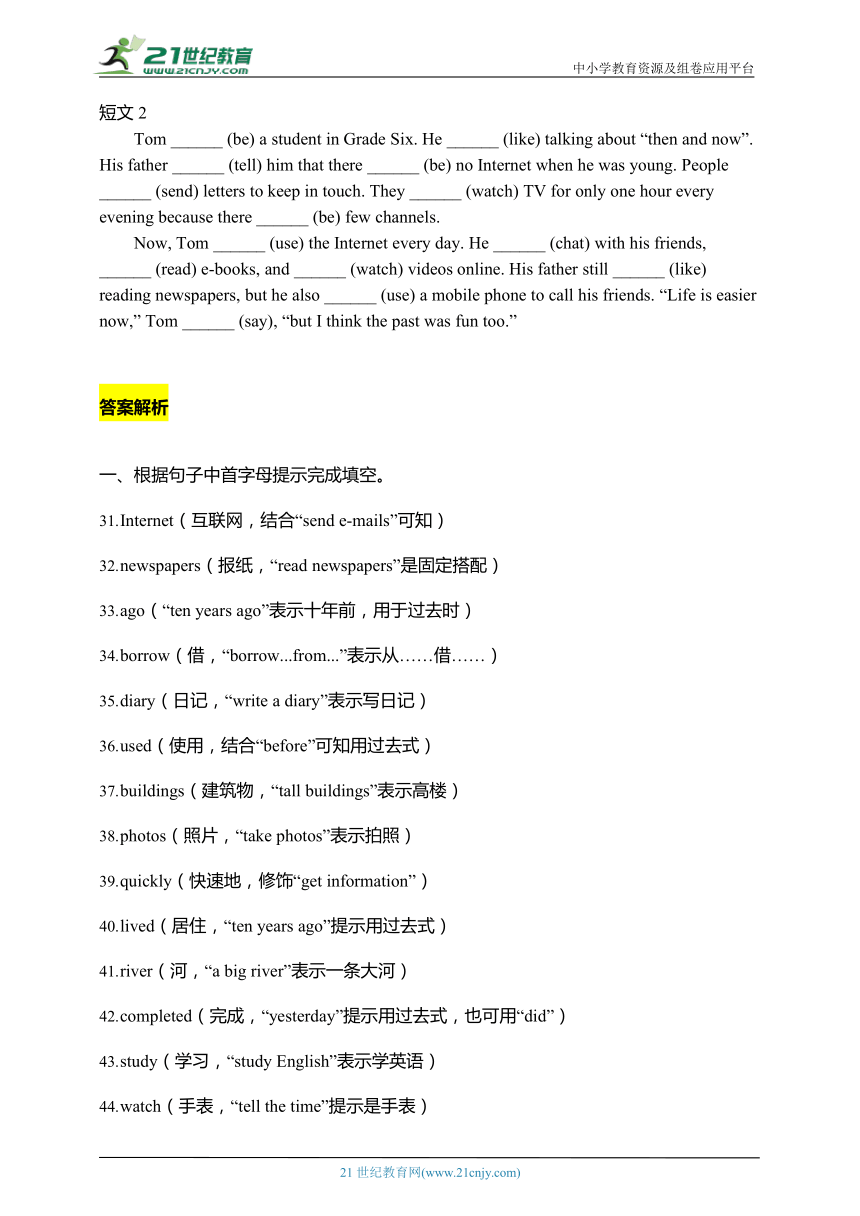牛津译林版六年级上册Unit4 Then and now单元词汇综合运用精练(含答案)
文档属性
| 名称 | 牛津译林版六年级上册Unit4 Then and now单元词汇综合运用精练(含答案) |  | |
| 格式 | docx | ||
| 文件大小 | 54.3KB | ||
| 资源类型 | 试卷 | ||
| 版本资源 | 牛津译林版 | ||
| 科目 | 英语 | ||
| 更新时间 | 2025-08-02 21:31:45 | ||
图片预览




文档简介
中小学教育资源及组卷应用平台
牛津译林版六年级上册Unit4 Then and now单元词汇综合运用精练
一、根据句子中首字母提示完成填空。
People used to send letters, but now they send e-mails on the I______.
My grandpa likes reading n______ every morning.
There was no gym in our school ten years a______.
You can b______ books from the library.
He wrote a d______ to record his daily life.
My father u______ a telephone to call his friends before.
There are many tall b______ in the city now.
She likes taking p______ with her new camera.
We can get information q______ on the Internet.
My uncle l______ in a small village ten years ago.
There was a big r______ near our old house.
He c______ his homework on the computer yesterday.
The students s______ English with their teacher in class.
My mother bought a new w______ to tell the time.
There were no c______ in our school when I was a pupil.
We can watch news on T______ every evening.
He r______ a bike to school when he was young.
The old man often t______ stories about his past.
There is a new s______ in our community. We can buy food there.
She s______ an e-mail to her pen friend last night.
My brother likes playing c______ games on the computer.
There was a small g______ in front of our old house.
He u______ to walk to school, but now he takes the bus.
We can listen to m______ on our phones.
The teacher wrote on the b______ with chalk before.
There are many k______ of books in the new library.
She d______ pictures with a pencil yesterday.
My father d______ a car to work every day now.
There were no t______ lights in the small town before.
We l______ to music on the radio in the past.
二、用括号里单词的正确形式完成句子。
My mother ______ (use) a washing machine now, but she washed clothes by hand before.
There ______ (be) no computers in our school ten years ago.
He ______ (write) a letter to his friend last night.
We ______ (watch) TV every evening, but my grandparents ______ (listen) to the radio before.
She ______ (take) many photos on her trip last summer.
There ______ (be) a big playground in our school now.
They ______ (live) in a small house before, but now they ______ (live) in a big flat.
My father ______ (read) newspapers every morning, but he ______ (read) e-books now.
The students ______ (study) online yesterday because of the rain.
I ______ (ride) a bike to school every day, but my brother ______ (walk) to school.
There ______ (be) many trees in the park now.
She ______ (buy) a new phone last week.
We ______ (have) a good time at the party last night.
My grandpa ______ (tell) us stories every evening when I was a child.
He ______ (not have) a computer before, but now he ______ (have) a new one.
They ______ (play) football on the playground now.
I ______ (see) a big river near the village yesterday.
She ______ (not use) a mobile phone ten years ago.
There ______ (be) a small shop near our home last year.
My brother ______ (watch) a film on the computer now.
We ______ (go) to the cinema last weekend.
He ______ (teach) English in a middle school now.
There ______ (be) no supermarkets in this town before.
She ______ (make) a cake for her mother’s birthday yesterday.
They ______ (visit) their grandparents every weekend.
I ______ (not ride) a bike before, but now I ______ (ride) it every day.
My sister ______ (draw) a picture in her room now.
There ______ (be) a lot of children in the park yesterday.
He ______ (send) an e-mail to his teacher just now.
We ______ (listen) to music on the radio in the past.
She ______ (read) a storybook every night.
There ______ (be) a new library in our city next year.
They ______ (play) basketball on the playground yesterday afternoon.
My father ______ (drive) to work every day now.
I ______ (meet) my old friend in the street last Sunday.
三、用括号里中文提示及句意完成句子。
We can ______ (借书) from the school library.
My father ______ (用电话) to call his parents ten years ago.
There ______ (没有电脑) in our home when I was young.
She likes ______ (拍照) when she travels.
We ______ (听收音机) to get news in the past.
There is a ______ (大超市) near our new home.
He ______ (写日记) every day to practice English.
My grandparents ______ (住在一个小村庄) ten years ago.
We can ______ (在网上聊天) with friends from all over the world.
There ______ (有一条小河) behind our old school.
She ______ (发了一封电子邮件) to her pen friend last night.
My brother likes ______ (玩电脑游戏) on weekends.
There ______ (有很多高楼) in the city now.
He ______ (骑自行车) to school every day.
We ______ (看报纸) to know the weather before.
There is a ______ (新体育馆) in our school now.
She ______ (用手机) to listen to music every day.
My mother ______ (洗衣服) by hand in the past.
We can ______ (快速获取信息) on the Internet.
There ______ (没有路灯) in the small town before.
He ______ (讲故事) about his childhood to us yesterday.
My sister ______ (画了一幅画) for her teacher last week.
There ______ (有一个大花园) in front of the old house.
We ______ (看电视) every evening after dinner.
She ______ (步行去学校) when she was in primary school.
There are many ______ (不同种类的书) in the new library.
He ______ (用电脑) to do his homework now.
My uncle ______ (开车去上班) every day.
There ______ (有很多树) in the park now.
We ______ (在课堂上学习英语) with our teacher.
She ______ (买了一块新手表) last month.
There ______ (有一个小商店) near our old home.
He ______ (每天读电子书) to learn new things.
My grandparents ______ (听音乐) on the radio before.
We ______ (在操场上踢足球) yesterday afternoon.
四、根据短文内容及括号里单词的正确形式填空。
短文1
Ten years ago, I ______ (live) in a small village with my grandparents. There ______ (be) no tall buildings, only small houses. We ______ (not have) a computer or a mobile phone. My grandpa ______ (read) newspapers every morning, and my grandma ______ (wash) clothes by hand. I ______ (walk) to school every day because there ______ (be) no buses. After school, I ______ (play) games with my friends in the field.
Now, I ______ (live) in the city with my parents. There ______ (be) many tall buildings and big supermarkets. We ______ (have) a computer and three mobile phones. My father ______ (work) on the computer every day, and my mother ______ (use) a washing machine to wash clothes. I ______ (take) the bus to school, and after school, I often ______ (chat) with my friends online. Life ______ (change) a lot!
短文2
Tom ______ (be) a student in Grade Six. He ______ (like) talking about “then and now”. His father ______ (tell) him that there ______ (be) no Internet when he was young. People ______ (send) letters to keep in touch. They ______ (watch) TV for only one hour every evening because there ______ (be) few channels.
Now, Tom ______ (use) the Internet every day. He ______ (chat) with his friends, ______ (read) e-books, and ______ (watch) videos online. His father still ______ (like) reading newspapers, but he also ______ (use) a mobile phone to call his friends. “Life is easier now,” Tom ______ (say), “but I think the past was fun too.”
答案解析
一、根据句子中首字母提示完成填空。
Internet(互联网,结合“send e-mails”可知)
newspapers(报纸,“read newspapers”是固定搭配)
ago(“ten years ago”表示十年前,用于过去时)
borrow(借,“borrow...from...”表示从……借……)
diary(日记,“write a diary”表示写日记)
used(使用,结合“before”可知用过去式)
buildings(建筑物,“tall buildings”表示高楼)
photos(照片,“take photos”表示拍照)
quickly(快速地,修饰“get information”)
lived(居住,“ten years ago”提示用过去式)
river(河,“a big river”表示一条大河)
completed(完成,“yesterday”提示用过去式,也可用“did”)
study(学习,“study English”表示学英语)
watch(手表,“tell the time”提示是手表)
computers(电脑,“no computers”表示没有电脑)
TV(电视,“watch news on TV”表示看电视新闻)
rode(骑,“when he was young”提示用过去式)
tells(讲,“often”提示用一般现在时,主语是第三人称单数)
shop/supermarket(商店/超市,“buy food”提示是购物场所)
sent(发送,“last night”提示用过去式)
computer(电脑,“computer games”表示电脑游戏)
garden(花园,“in front of our old house”提示是花园)
used(“used to do”表示过去常常做某事)
music(音乐,“listen to music”表示听音乐)
blackboard(黑板,“wrote on the blackboard”表示在黑板上写)
kinds(种类,“many kinds of”表示许多种)
drew(画,“yesterday”提示用过去式)
drives(驾驶,“every day”提示用一般现在时,主语是第三人称单数)
traffic(交通,“traffic lights”表示交通灯)
listened(听,“in the past”提示用过去式)
二、用括号里单词的正确形式完成句子。
is using(“now”提示用现在进行时)
were(“ten years ago”提示用过去时,“computers”是复数)
wrote(“last night”提示用过去式)
watch; listened(前半句“every evening”用一般现在时;后半句“before”用过去式)
took(“last summer”提示用过去式)
is(“now”提示用现在时,“a big playground”是单数)
lived; live(前半句“before”用过去式;后半句“now”用一般现在时)
reads; reads(“every morning”和“now”均提示用一般现在时,主语是第三人称单数)
studied(“yesterday”提示用过去式)
ride; walks(“every day”提示用一般现在时,第二空主语是第三人称单数)
are(“now”提示用现在时,“many trees”是复数)
bought(“last week”提示用过去式)
had(“last night”提示用过去式)
told(“when I was a child”提示用过去式)
didn’t have; has(前半句“before”用过去时否定;后半句“now”用一般现在时,主语是第三人称单数)
are playing(“now”提示用现在进行时)
saw(“yesterday”提示用过去式)
didn’t use(“ten years ago”提示用过去时否定)
was(“last year”提示用过去时,“a small shop”是单数)
is watching(“now”提示用现在进行时)
went(“last weekend”提示用过去式)
teaches(“now”提示用一般现在时,主语是第三人称单数)
were(“before”提示用过去时,“supermarkets”是复数)
made(“yesterday”提示用过去式)
visit(“every weekend”提示用一般现在时)
didn’t ride; ride(前半句“before”用过去时否定;后半句“now”用一般现在时)
is drawing(“now”提示用现在进行时)
were(“yesterday”提示用过去时,“a lot of children”是复数)
sent(“just now”提示用过去式)
listened(“in the past”提示用过去式)
reads(“every night”提示用一般现在时,主语是第三人称单数)
will be(“next year”提示用一般将来时)
played(“yesterday afternoon”提示用过去式)
drives(“every day”提示用一般现在时,主语是第三人称单数)
met(“last Sunday”提示用过去式)
三、用括号里中文提示及句意完成句子。
borrow books(“借书”是“borrow books”)
used a telephone(“用电话”,“ten years ago”提示用过去式)
were no computers(“没有电脑”,“when I was young”提示用过去时,复数)
taking photos(“拍照”是“take photos”,“like doing”表示喜欢做某事)
listened to the radio(“听收音机”,“in the past”提示用过去式)
big supermarket(“大超市”是“big supermarket”)
writes a diary(“写日记”,“every day”提示用一般现在时,主语是第三人称单数)
lived in a small village(“住在一个小村庄”,“ten years ago”提示用过去式)
chat online(“在网上聊天”是“chat online”,“can”后接动词原形)
was a small river(“有一条小河”,“old school”提示用过去时,单数)
sent an e-mail(“发了一封电子邮件”,“last night”提示用过去式)
playing computer games(“玩电脑游戏”是“play computer games”,“like doing”表示喜欢做某事)
are many tall buildings(“有很多高楼”,“now”提示用现在时,复数)
rides a bike(“骑自行车”,“every day”提示用一般现在时,主语是第三人称单数)
read newspapers(“看报纸”,“before”提示用过去式)
new gym(“新体育馆”是“new gym”)
uses a mobile phone(“用手机”,“every day”提示用一般现在时,主语是第三人称单数)
washed clothes(“洗衣服”,“in the past”提示用过去式)
get information quickly(“快速获取信息”是“get information quickly”,“can”后接动词原形)
were no street lights(“没有路灯”,“before”提示用过去时,复数)
told stories(“讲故事”,“yesterday”提示用过去式)
drew a picture(“画了一幅画”,“last week”提示用过去式)
was a big garden(“有一个大花园”,“old house”提示用过去时,单数)
watch TV(“看电视”,“every evening”提示用一般现在时)
walked to school(“步行去学校”,“when she was...”提示用过去式)
different kinds of books(“不同种类的书”是“different kinds of books”)
uses a computer(“用电脑”,“now”提示用一般现在时,主语是第三人称单数)
drives to work(“开车去上班”,“every day”提示用一般现在时,主语是第三人称单数)
are many trees(“有很多树”,“now”提示用现在时,复数)
study English in class(“在课堂上学习英语”是“study English in class”)
bought a new watch(“买了一块新手表”,“last month”提示用过去式)
was a small shop(“有一个小商店”,“old home”提示用过去时,单数)
reads e-books every day(“每天读电子书”,“every day”提示用一般现在时,主语是第三人称单数)
listened to music(“听音乐”,“before”提示用过去式)
played football on the playground(“在操场上踢足球”,“yesterday afternoon”提示用过去式)
四、根据短文内容及括号里单词的正确形式填空。
短文1
lived(“Ten years ago”提示用过去式)
were(“no tall buildings”是复数,过去时)
didn’t have(过去时否定,“no computer”提示)
read(过去式,“every morning”在此处描述过去习惯)
washed(过去式,与“grandpa read”并列)
walked(过去式,描述过去行为)
were(“no buses”是复数,过去时)
played(过去式,与“walked”并列)
live(“now”提示用一般现在时)
are(“many tall buildings”是复数,现在时)
have(现在时,描述现在拥有)
works(现在时,主语是第三人称单数)
uses(现在时,主语是第三人称单数)
take(“often”提示用一般现在时)
chat(“often”提示用一般现在时)
has changed(强调过去到现在的变化,用现在完成时)
短文2
is(现在时,主语是第三人称单数)
likes(现在时,主语是第三人称单数)
tells(现在时,描述常态)
was(“when he was young”提示过去时,“no Internet”是单数)
sent(过去时,描述过去行为)
watched(过去时,与“sent”并列)
were(过去时,“few channels”是复数)
uses(现在时,主语是第三人称单数)
chats(现在时,主语是第三人称单数,与“reads, watches”并列)
reads(现在时,主语是第三人称单数)
watches(现在时,主语是第三人称单数)
likes(现在时,主语是第三人称单数)
uses(现在时,主语是第三人称单数)
says(现在时,主语是第三人称单数)
21世纪教育网 www.21cnjy.com 精品试卷·第 2 页 (共 2 页)
21世纪教育网(www.21cnjy.com)
牛津译林版六年级上册Unit4 Then and now单元词汇综合运用精练
一、根据句子中首字母提示完成填空。
People used to send letters, but now they send e-mails on the I______.
My grandpa likes reading n______ every morning.
There was no gym in our school ten years a______.
You can b______ books from the library.
He wrote a d______ to record his daily life.
My father u______ a telephone to call his friends before.
There are many tall b______ in the city now.
She likes taking p______ with her new camera.
We can get information q______ on the Internet.
My uncle l______ in a small village ten years ago.
There was a big r______ near our old house.
He c______ his homework on the computer yesterday.
The students s______ English with their teacher in class.
My mother bought a new w______ to tell the time.
There were no c______ in our school when I was a pupil.
We can watch news on T______ every evening.
He r______ a bike to school when he was young.
The old man often t______ stories about his past.
There is a new s______ in our community. We can buy food there.
She s______ an e-mail to her pen friend last night.
My brother likes playing c______ games on the computer.
There was a small g______ in front of our old house.
He u______ to walk to school, but now he takes the bus.
We can listen to m______ on our phones.
The teacher wrote on the b______ with chalk before.
There are many k______ of books in the new library.
She d______ pictures with a pencil yesterday.
My father d______ a car to work every day now.
There were no t______ lights in the small town before.
We l______ to music on the radio in the past.
二、用括号里单词的正确形式完成句子。
My mother ______ (use) a washing machine now, but she washed clothes by hand before.
There ______ (be) no computers in our school ten years ago.
He ______ (write) a letter to his friend last night.
We ______ (watch) TV every evening, but my grandparents ______ (listen) to the radio before.
She ______ (take) many photos on her trip last summer.
There ______ (be) a big playground in our school now.
They ______ (live) in a small house before, but now they ______ (live) in a big flat.
My father ______ (read) newspapers every morning, but he ______ (read) e-books now.
The students ______ (study) online yesterday because of the rain.
I ______ (ride) a bike to school every day, but my brother ______ (walk) to school.
There ______ (be) many trees in the park now.
She ______ (buy) a new phone last week.
We ______ (have) a good time at the party last night.
My grandpa ______ (tell) us stories every evening when I was a child.
He ______ (not have) a computer before, but now he ______ (have) a new one.
They ______ (play) football on the playground now.
I ______ (see) a big river near the village yesterday.
She ______ (not use) a mobile phone ten years ago.
There ______ (be) a small shop near our home last year.
My brother ______ (watch) a film on the computer now.
We ______ (go) to the cinema last weekend.
He ______ (teach) English in a middle school now.
There ______ (be) no supermarkets in this town before.
She ______ (make) a cake for her mother’s birthday yesterday.
They ______ (visit) their grandparents every weekend.
I ______ (not ride) a bike before, but now I ______ (ride) it every day.
My sister ______ (draw) a picture in her room now.
There ______ (be) a lot of children in the park yesterday.
He ______ (send) an e-mail to his teacher just now.
We ______ (listen) to music on the radio in the past.
She ______ (read) a storybook every night.
There ______ (be) a new library in our city next year.
They ______ (play) basketball on the playground yesterday afternoon.
My father ______ (drive) to work every day now.
I ______ (meet) my old friend in the street last Sunday.
三、用括号里中文提示及句意完成句子。
We can ______ (借书) from the school library.
My father ______ (用电话) to call his parents ten years ago.
There ______ (没有电脑) in our home when I was young.
She likes ______ (拍照) when she travels.
We ______ (听收音机) to get news in the past.
There is a ______ (大超市) near our new home.
He ______ (写日记) every day to practice English.
My grandparents ______ (住在一个小村庄) ten years ago.
We can ______ (在网上聊天) with friends from all over the world.
There ______ (有一条小河) behind our old school.
She ______ (发了一封电子邮件) to her pen friend last night.
My brother likes ______ (玩电脑游戏) on weekends.
There ______ (有很多高楼) in the city now.
He ______ (骑自行车) to school every day.
We ______ (看报纸) to know the weather before.
There is a ______ (新体育馆) in our school now.
She ______ (用手机) to listen to music every day.
My mother ______ (洗衣服) by hand in the past.
We can ______ (快速获取信息) on the Internet.
There ______ (没有路灯) in the small town before.
He ______ (讲故事) about his childhood to us yesterday.
My sister ______ (画了一幅画) for her teacher last week.
There ______ (有一个大花园) in front of the old house.
We ______ (看电视) every evening after dinner.
She ______ (步行去学校) when she was in primary school.
There are many ______ (不同种类的书) in the new library.
He ______ (用电脑) to do his homework now.
My uncle ______ (开车去上班) every day.
There ______ (有很多树) in the park now.
We ______ (在课堂上学习英语) with our teacher.
She ______ (买了一块新手表) last month.
There ______ (有一个小商店) near our old home.
He ______ (每天读电子书) to learn new things.
My grandparents ______ (听音乐) on the radio before.
We ______ (在操场上踢足球) yesterday afternoon.
四、根据短文内容及括号里单词的正确形式填空。
短文1
Ten years ago, I ______ (live) in a small village with my grandparents. There ______ (be) no tall buildings, only small houses. We ______ (not have) a computer or a mobile phone. My grandpa ______ (read) newspapers every morning, and my grandma ______ (wash) clothes by hand. I ______ (walk) to school every day because there ______ (be) no buses. After school, I ______ (play) games with my friends in the field.
Now, I ______ (live) in the city with my parents. There ______ (be) many tall buildings and big supermarkets. We ______ (have) a computer and three mobile phones. My father ______ (work) on the computer every day, and my mother ______ (use) a washing machine to wash clothes. I ______ (take) the bus to school, and after school, I often ______ (chat) with my friends online. Life ______ (change) a lot!
短文2
Tom ______ (be) a student in Grade Six. He ______ (like) talking about “then and now”. His father ______ (tell) him that there ______ (be) no Internet when he was young. People ______ (send) letters to keep in touch. They ______ (watch) TV for only one hour every evening because there ______ (be) few channels.
Now, Tom ______ (use) the Internet every day. He ______ (chat) with his friends, ______ (read) e-books, and ______ (watch) videos online. His father still ______ (like) reading newspapers, but he also ______ (use) a mobile phone to call his friends. “Life is easier now,” Tom ______ (say), “but I think the past was fun too.”
答案解析
一、根据句子中首字母提示完成填空。
Internet(互联网,结合“send e-mails”可知)
newspapers(报纸,“read newspapers”是固定搭配)
ago(“ten years ago”表示十年前,用于过去时)
borrow(借,“borrow...from...”表示从……借……)
diary(日记,“write a diary”表示写日记)
used(使用,结合“before”可知用过去式)
buildings(建筑物,“tall buildings”表示高楼)
photos(照片,“take photos”表示拍照)
quickly(快速地,修饰“get information”)
lived(居住,“ten years ago”提示用过去式)
river(河,“a big river”表示一条大河)
completed(完成,“yesterday”提示用过去式,也可用“did”)
study(学习,“study English”表示学英语)
watch(手表,“tell the time”提示是手表)
computers(电脑,“no computers”表示没有电脑)
TV(电视,“watch news on TV”表示看电视新闻)
rode(骑,“when he was young”提示用过去式)
tells(讲,“often”提示用一般现在时,主语是第三人称单数)
shop/supermarket(商店/超市,“buy food”提示是购物场所)
sent(发送,“last night”提示用过去式)
computer(电脑,“computer games”表示电脑游戏)
garden(花园,“in front of our old house”提示是花园)
used(“used to do”表示过去常常做某事)
music(音乐,“listen to music”表示听音乐)
blackboard(黑板,“wrote on the blackboard”表示在黑板上写)
kinds(种类,“many kinds of”表示许多种)
drew(画,“yesterday”提示用过去式)
drives(驾驶,“every day”提示用一般现在时,主语是第三人称单数)
traffic(交通,“traffic lights”表示交通灯)
listened(听,“in the past”提示用过去式)
二、用括号里单词的正确形式完成句子。
is using(“now”提示用现在进行时)
were(“ten years ago”提示用过去时,“computers”是复数)
wrote(“last night”提示用过去式)
watch; listened(前半句“every evening”用一般现在时;后半句“before”用过去式)
took(“last summer”提示用过去式)
is(“now”提示用现在时,“a big playground”是单数)
lived; live(前半句“before”用过去式;后半句“now”用一般现在时)
reads; reads(“every morning”和“now”均提示用一般现在时,主语是第三人称单数)
studied(“yesterday”提示用过去式)
ride; walks(“every day”提示用一般现在时,第二空主语是第三人称单数)
are(“now”提示用现在时,“many trees”是复数)
bought(“last week”提示用过去式)
had(“last night”提示用过去式)
told(“when I was a child”提示用过去式)
didn’t have; has(前半句“before”用过去时否定;后半句“now”用一般现在时,主语是第三人称单数)
are playing(“now”提示用现在进行时)
saw(“yesterday”提示用过去式)
didn’t use(“ten years ago”提示用过去时否定)
was(“last year”提示用过去时,“a small shop”是单数)
is watching(“now”提示用现在进行时)
went(“last weekend”提示用过去式)
teaches(“now”提示用一般现在时,主语是第三人称单数)
were(“before”提示用过去时,“supermarkets”是复数)
made(“yesterday”提示用过去式)
visit(“every weekend”提示用一般现在时)
didn’t ride; ride(前半句“before”用过去时否定;后半句“now”用一般现在时)
is drawing(“now”提示用现在进行时)
were(“yesterday”提示用过去时,“a lot of children”是复数)
sent(“just now”提示用过去式)
listened(“in the past”提示用过去式)
reads(“every night”提示用一般现在时,主语是第三人称单数)
will be(“next year”提示用一般将来时)
played(“yesterday afternoon”提示用过去式)
drives(“every day”提示用一般现在时,主语是第三人称单数)
met(“last Sunday”提示用过去式)
三、用括号里中文提示及句意完成句子。
borrow books(“借书”是“borrow books”)
used a telephone(“用电话”,“ten years ago”提示用过去式)
were no computers(“没有电脑”,“when I was young”提示用过去时,复数)
taking photos(“拍照”是“take photos”,“like doing”表示喜欢做某事)
listened to the radio(“听收音机”,“in the past”提示用过去式)
big supermarket(“大超市”是“big supermarket”)
writes a diary(“写日记”,“every day”提示用一般现在时,主语是第三人称单数)
lived in a small village(“住在一个小村庄”,“ten years ago”提示用过去式)
chat online(“在网上聊天”是“chat online”,“can”后接动词原形)
was a small river(“有一条小河”,“old school”提示用过去时,单数)
sent an e-mail(“发了一封电子邮件”,“last night”提示用过去式)
playing computer games(“玩电脑游戏”是“play computer games”,“like doing”表示喜欢做某事)
are many tall buildings(“有很多高楼”,“now”提示用现在时,复数)
rides a bike(“骑自行车”,“every day”提示用一般现在时,主语是第三人称单数)
read newspapers(“看报纸”,“before”提示用过去式)
new gym(“新体育馆”是“new gym”)
uses a mobile phone(“用手机”,“every day”提示用一般现在时,主语是第三人称单数)
washed clothes(“洗衣服”,“in the past”提示用过去式)
get information quickly(“快速获取信息”是“get information quickly”,“can”后接动词原形)
were no street lights(“没有路灯”,“before”提示用过去时,复数)
told stories(“讲故事”,“yesterday”提示用过去式)
drew a picture(“画了一幅画”,“last week”提示用过去式)
was a big garden(“有一个大花园”,“old house”提示用过去时,单数)
watch TV(“看电视”,“every evening”提示用一般现在时)
walked to school(“步行去学校”,“when she was...”提示用过去式)
different kinds of books(“不同种类的书”是“different kinds of books”)
uses a computer(“用电脑”,“now”提示用一般现在时,主语是第三人称单数)
drives to work(“开车去上班”,“every day”提示用一般现在时,主语是第三人称单数)
are many trees(“有很多树”,“now”提示用现在时,复数)
study English in class(“在课堂上学习英语”是“study English in class”)
bought a new watch(“买了一块新手表”,“last month”提示用过去式)
was a small shop(“有一个小商店”,“old home”提示用过去时,单数)
reads e-books every day(“每天读电子书”,“every day”提示用一般现在时,主语是第三人称单数)
listened to music(“听音乐”,“before”提示用过去式)
played football on the playground(“在操场上踢足球”,“yesterday afternoon”提示用过去式)
四、根据短文内容及括号里单词的正确形式填空。
短文1
lived(“Ten years ago”提示用过去式)
were(“no tall buildings”是复数,过去时)
didn’t have(过去时否定,“no computer”提示)
read(过去式,“every morning”在此处描述过去习惯)
washed(过去式,与“grandpa read”并列)
walked(过去式,描述过去行为)
were(“no buses”是复数,过去时)
played(过去式,与“walked”并列)
live(“now”提示用一般现在时)
are(“many tall buildings”是复数,现在时)
have(现在时,描述现在拥有)
works(现在时,主语是第三人称单数)
uses(现在时,主语是第三人称单数)
take(“often”提示用一般现在时)
chat(“often”提示用一般现在时)
has changed(强调过去到现在的变化,用现在完成时)
短文2
is(现在时,主语是第三人称单数)
likes(现在时,主语是第三人称单数)
tells(现在时,描述常态)
was(“when he was young”提示过去时,“no Internet”是单数)
sent(过去时,描述过去行为)
watched(过去时,与“sent”并列)
were(过去时,“few channels”是复数)
uses(现在时,主语是第三人称单数)
chats(现在时,主语是第三人称单数,与“reads, watches”并列)
reads(现在时,主语是第三人称单数)
watches(现在时,主语是第三人称单数)
likes(现在时,主语是第三人称单数)
uses(现在时,主语是第三人称单数)
says(现在时,主语是第三人称单数)
21世纪教育网 www.21cnjy.com 精品试卷·第 2 页 (共 2 页)
21世纪教育网(www.21cnjy.com)
